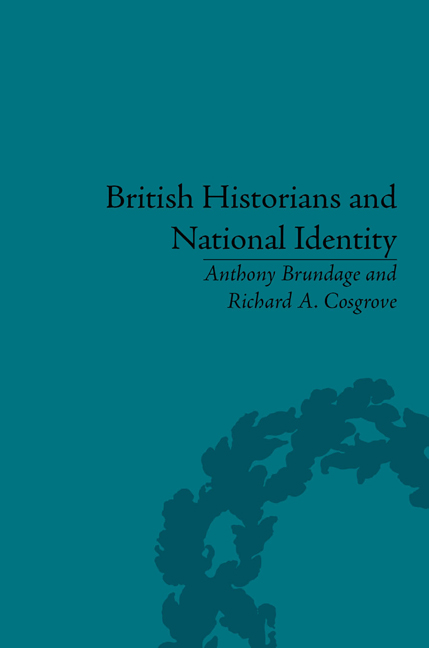Book contents
- Frontmatter
- CONTENTS
- Dedication
- Acknowledgements
- Introduction
- 1 Demythologizing the Nation's Past: David Hume's History of England
- 2 Catharine Macaulay's Vindication of Radicalism and the Republican Tradition
- 3 Reassessing Religion and the National Narrative: John Lingard and the English Reformation
- 4 Placing the Constitution at the Heart of National Identity: Henry Hallam and Constitutional History
- 5 Thomas Babington Macaulay: Writing the History of a Progressive People
- 6 The Glories of the Reformation and the Origins of Empire: J. A. Froude's Celebration of the Tudor Era
- 7 Edward Augustus Freeman: Liberal Democracy and National Identity
- 8 William Stubbs: The Continuity of English History as National Identity
- 9 Celebrating the People: J. R. Green's Short History
- 10 Samuel Rawson Gardiner: Incorporating Dissent into the National Story
- 11 In Thrall to English Tradition and Character: G. M. Trevelyan's Panoramic Histories of the Island Race
- 12 The Anglosphere as Global Model: Winston Churchill's History of the English-Speaking Peoples
- Conclusion
- Notes
- Works Cited
- Index
9 - Celebrating the People: J. R. Green's Short History
- Frontmatter
- CONTENTS
- Dedication
- Acknowledgements
- Introduction
- 1 Demythologizing the Nation's Past: David Hume's History of England
- 2 Catharine Macaulay's Vindication of Radicalism and the Republican Tradition
- 3 Reassessing Religion and the National Narrative: John Lingard and the English Reformation
- 4 Placing the Constitution at the Heart of National Identity: Henry Hallam and Constitutional History
- 5 Thomas Babington Macaulay: Writing the History of a Progressive People
- 6 The Glories of the Reformation and the Origins of Empire: J. A. Froude's Celebration of the Tudor Era
- 7 Edward Augustus Freeman: Liberal Democracy and National Identity
- 8 William Stubbs: The Continuity of English History as National Identity
- 9 Celebrating the People: J. R. Green's Short History
- 10 Samuel Rawson Gardiner: Incorporating Dissent into the National Story
- 11 In Thrall to English Tradition and Character: G. M. Trevelyan's Panoramic Histories of the Island Race
- 12 The Anglosphere as Global Model: Winston Churchill's History of the English-Speaking Peoples
- Conclusion
- Notes
- Works Cited
- Index
Summary
John Richard Green (1837–83), the author of the highly successful Short History of the English People (1874), was born in Oxford. The son of a maker of silk gowns for Fellows, he grew up in straitened circumstances in a strongly Tory and Anglican household. His small size and delicate health deprived him of normal boyhood activities, but he displayed an early passion for books and history. In 1852 he suffered the loss of both his father and his beloved elder sister, Adelaide. Placed under the domination of an ultra-conservative uncle who demanded constant gratitude and deference, Green rebelled by adopting outspokenly liberal viewpoints, evidenced in a school history essay sharply criticizing Charles I. Such defiance of the cult of the ‘royal martyr’ led to his expulsion in 1854 from Magdalen College School. His preparation for university was completed under the tutelage of James Ridgway and, more successfully, Charles Duke Yonge, later a professor of English at the University of Belfast.
Green managed to secure a scholarship to Jesus College, Oxford, then perhaps the least distinguished college in a university barely stirring from its pre-reform torpor. After beginning his studies there in 1856, he quickly became disillusioned, read widely on his own, wrote scathing satires of dons and fellow students and took a pass degree in 1859. Immediately afterward, he was commissioned by the editors of the Oxford Chronicle to write a series of articles on eighteenth-century Oxford life.
- Type
- Chapter
- Information
- British Historians and National IdentityFrom Hume to Churchill, pp. 125 - 144Publisher: Pickering & ChattoFirst published in: 2014



